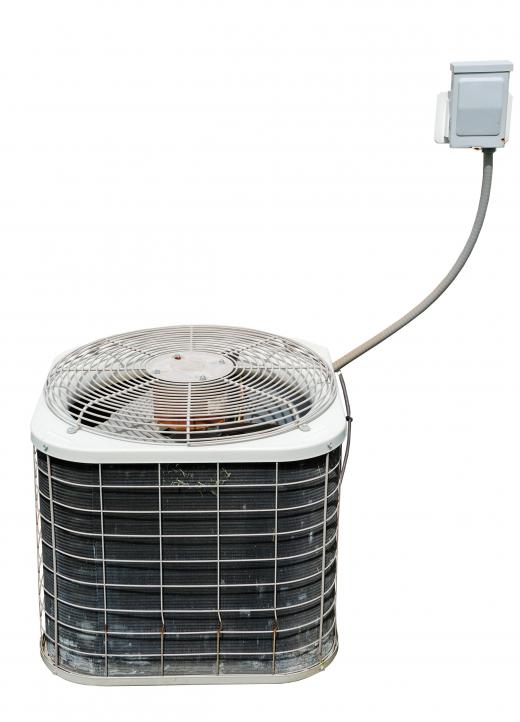An air conditioning condenser is a vital part of an air conditioner responsible for cooling vapors coming from a compressor. It is not only used in traditional air conditioners, but also refrigerators and almost any other type of device that delivers refrigerant, or cooled air, to another location. Sometimes, this portion of the air conditioner is confused with the outside unit in a split system.
The air conditioning condenser looks very much like a coil, or perhaps a radiator. Its job is to take hot gaseous vapor coming from the condenser, and cool it back into a liquid form. It does this through a process called condensation. Water vapor in the air, which is a gas, goes through a similar process when it becomes liquid dew, commonly seen in the morning. The condenser cools the gas to a certain point to create the same effect.

Heat in an air conditioning condenser is transferred through the coils, and then out into the air. In an air conditioning unit the hot air is expelled outside, and the liquid refrigerant then moves on to the next step in the process, which is the expansion device. In the case of refrigerators, the hot air is usually simply expelled underneath or behind the unit. In most cases, the condenser will need a little help to cool the liquid fast enough, which is why a fan is often used. The fan does not truly make the refrigerant cooler, but rather aids in the transfer of heat from inside the coil to the surrounding air. Thus, the natural result is less heat in the refrigerant itself.

It should be noted that while many outside units are referred to as air conditioning condensers, that is not the truth. The most visible part of the units in the outside shell is often the condenser unit or components that help the condenser, which may be why there is some confusion. The condenser is actually one of multiple components located inside that shell. Also included in the outside portion of a split air conditioning system is the compressor. The components work together to provide the desired cooled air to a controlled environment.
Depending on the age of the air conditioner, its running conditions and use, there may be certain parts of the air conditioning condenser that need to be replaced from time to time. These include the coils, commonly called evaporator coils, which may become corroded eventually. This could cause refrigerant to leak out. The fan motor is another unit vital to the condenser that may go bad from time to time.
